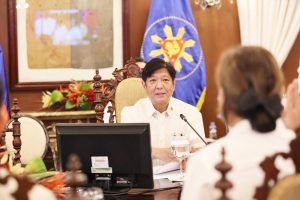The inaugural speech of Philippine President Ferdinand Marcos Jr. tackled several crucial issues affecting the country, including food security and the climate crisis; but it is also instructive for what it didn’t mention: the peace process, human rights, and media censorship.
Attacks on the free press escalated in June, which coincided with the last 30 days of the Rodrigo Duterte presidency. Journalists were among those arrested for covering an agrarian reform dispute, two independent news websites were blocked by authorities for allegedly supporting terrorism, a local court affirmed the decision of the Securities and Exchange Commission revoking the papers of social news site Rappler, and Duterte finally admitted in public that he had used his presidential powers to force the closure of the country’s biggest media broadcaster.
It is unlikely that Marcos was not informed about these incidents because they were prominently reported by the local media. After his inauguration, another court affirmed the cyber libel conviction of Rappler editor and Nobel laureate Maria Ressa. Again, Marcos and his government failed to comment on these developments and their possible chilling effect on society. Either Marcos is oblivious about the decline of press freedom or he doesn’t consider the website blocking, media shutdown, and court conviction of journalists as constituting an alarming trend intended to undermine the constitutionally-guaranteed right to freedom of expression.
One way to determine the policies that Marcos will pursue related to upholding the people’s right to information is to review the way he handled the media during the three-month campaign period early this year. His behavior towards the media was, to put it mildly, condescending. He was notorious for avoiding media-sponsored debates, ignoring reporters on the campaign trail, and refusing to be interviewed by journalists whom he considered biased against him and his family. Instead, Marcos chose to attend a presidential forum organized by a media company owned by a controversial pastor who had endorsed his candidacy. A Human Rights Watch researcher warned that Marcos’ “contempt for the media could pose serious risks for democracy in the Philippines.”
After sidelining the media, Marcos relied on his social media followers and video bloggers, or vloggers, to reach out to Filipino netizens. His press secretary is a vlogger who was suspended by the Supreme Court in 2016 for three years for violating the lawyer’s code of conduct. The proposal of the new press secretary to accredit vloggers during the president’s press briefings drew mixed reactions. The National Union of Journalists of the Philippines (NUJP) thinks it could legitimize the work of pro-Marcos vloggers known for spreading disinformation.
“Wider access is good, but must not be at the expense of institutional media, which has been sidelined during the campaign as false information spread rapidly online, many of which have been traced to the same network,” the NUJP said in a statement.
Indeed, Marcos benefited from a massive and long-running disinformation campaign that featured the online dissemination of videos and other promotional materials containing dubious narratives about his family. Since his inauguration as president, his supporters have expanded their aim by insisting that history is mere gossip. As pro-Marcos forces seem poised to revise documented narratives about the president’s father, who was the country’s dictator for two decades until his ouster in 1986, the role of an independent media in scrutinizing this potentially sinister state-backed operation is now more crucial than ever.
During the dictatorship, media outlets were closed down and critical editors were sent to prison. Media repression is a Martial Law legacy that the incumbent president may not wish to acknowledge. This could partly explain his decision to refrain from commenting on the restrictive policies imposed by the previous government against the media.
But his indifference did not stop journalists from fulfilling their work. It was the media that fact-checked his inaugural speech for containing several lies, misleading assertions, and historical inaccuracies. Independent media challenged the blocking of their websites by seeking an injunction from the court. Meanwhile, Rappler and Ressa said they will appeal their case all the way to the Supreme Court.
As a candidate, Marcos could afford to ignore the media as his supporters bombarded the public with disinformation content. But as president, he cannot simply walk away from public events and ban the media from interviewing him for the next six years. Otherwise, he risks further antagonizing an institution that played an important part in popularizing the democracy movement that led to the eventual downfall of his father.

































